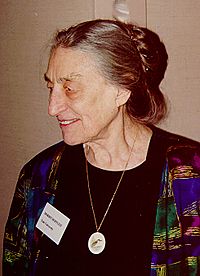Dorrit Hoffleit facts for kids
Quick facts for kids
Dorrit Hoffleit
|
|
|---|---|
 |
|
| Born | March 12, 1907 |
| Died | April 9, 2007 (aged 100) |
| Nationality | American |
| Other names | Ellen Dorrit Hoffleit |
| Alma mater | Radcliffe College |
| Known for | Bright Star Catalog |
| Awards | Caroline Wilby Prize George Van Biesbroeck Prize (1988) |
| Scientific career | |
| Fields | Astronomy |
| Institutions | Harvard College Observatory, Ballistic Research Laboratory, Harvard University, Yale University, Maria Mitchell Observatory |
| Thesis | On the Spectroscopic Determination of Absolute Magnitudes, With Application to the Southern Stars of Types Later than A. (1938) |
| Doctoral advisor | Bart Bok |
Ellen Dorrit Hoffleit (born March 12, 1907 – died April 9, 2007) was an American astronomer. She worked at Yale University and was known for studying variable stars, measuring star positions (astrometry), and analyzing starlight (spectroscopy). She also studied meteors and created the famous Bright Star Catalog. Dorrit Hoffleit was also a great mentor to many young astronomers.
Contents
Early Life and Education
Dorrit Hoffleit's interest in space began when she was young. In 1919, she saw the Perseid meteor shower with her mother. This amazing sight sparked her love for astronomy.
She went to college and earned her first degree in mathematics in 1928. After that, she started working at the Harvard College Observatory. There, she helped find and study variable stars.
Dorrit Hoffleit continued her studies and earned her Ph.D. in astronomy in 1938. This advanced degree helped her become a professional astronomer.
Career in Astronomy
After getting her Ph.D., Dorrit Hoffleit worked at Harvard University. She stayed there until 1956. Then, she moved to Yale University, where she worked until she retired in 1975.
At Yale, she continued the work of another important astronomer, Ida Barney. Dorrit Hoffleit focused on measuring the exact positions of stars. She said that knowing Ida Barney was a "pleasure, inspiration, and privilege."
Leading the Maria Mitchell Observatory
From 1957 to 1978, Hoffleit was also the director of the Maria Mitchell Observatory. This observatory is located on Nantucket Island.
During the summers, she ran special programs for over 100 students. Many of these students later became successful astronomers. She helped guide and inspire a new generation of scientists.
Teaching and Inspiring Students
In her later years at Yale, Hoffleit taught a basic astronomy course. Her lectures were very popular, often with more than 100 students. She was very passionate about teaching.
She helped many young men and women discover a lifelong interest in astronomy. Many of these students were just taking the class as a requirement. But her teaching made them love the subject.
Work with the U.S. Army
In the mid-1950s, Dorrit Hoffleit also worked as a consultant for the U.S. Army. She helped their Ballistic Research Laboratory with calculations related to the Doppler effect. This involved understanding how sound or light waves change as their source moves.
Major Contributions to Astronomy
Dorrit Hoffleit is famous for her important work in astronomy. She created two major catalogs that are still used today.
The Bright Star Catalogue
She was the author of the Bright Star Catalogue. This book is a huge collection of information about the 9,110 brightest stars in the sky. It's a key resource for astronomers.
The General Catalogue of Trigonometric Stellar Parallaxes
She also helped write The General Catalogue of Trigonometric Stellar Parallaxes. This catalog has precise measurements of distances to 8,112 stars. Knowing these distances helps scientists understand how stars move in our Milky Way galaxy. It also helps us learn about the area around our solar system.
Discovering Quasar Variability
With another astronomer, Harlan J. Smith, Hoffleit discovered something important about 3C 273. This was the first quasar ever found. They showed that its light changed over time. Quasars are very bright objects powered by supermassive black holes.
Awards and Legacy
In 1988, Dorrit Hoffleit received the George Van Biesbroeck Prize. This award was given by the American Astronomical Society. It honored her many years of service to astronomy.
Dorrit Hoffleit lived to be 100 years old. She passed away a month after her 100th birthday in April 2007. Her work continues to be important for astronomers around the world.
See also
 In Spanish: Dorrit Hoffleit para niños
In Spanish: Dorrit Hoffleit para niños
 | John T. Biggers |
 | Thomas Blackshear |
 | Mark Bradford |
 | Beverly Buchanan |

